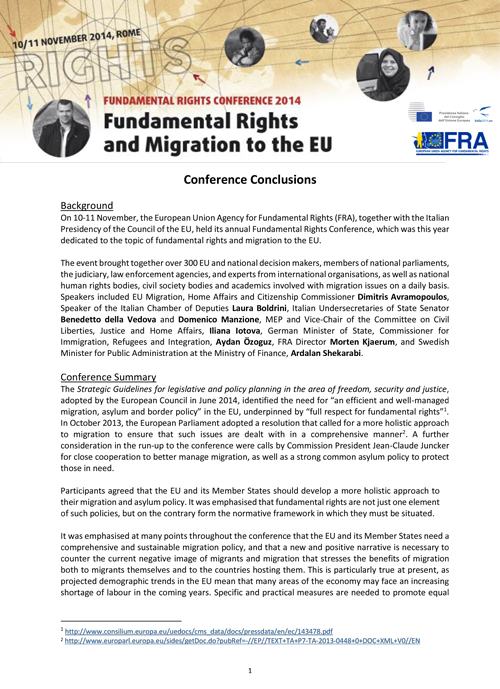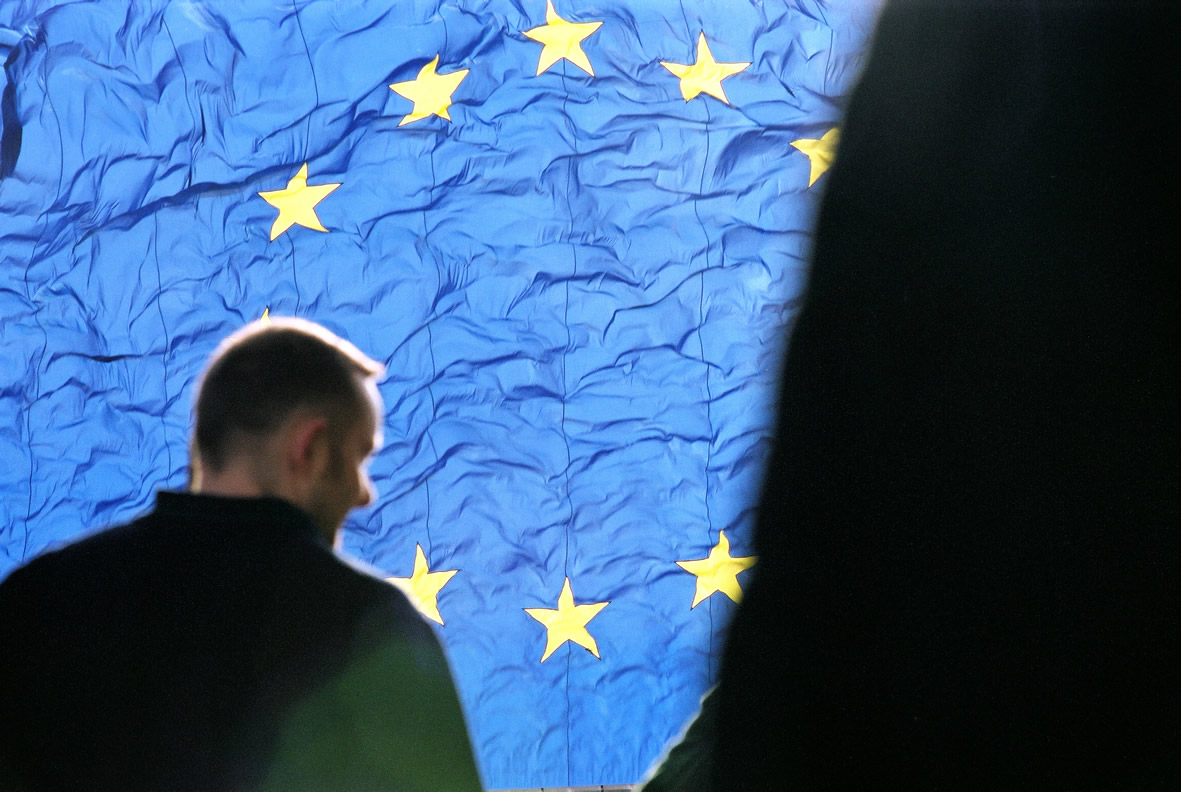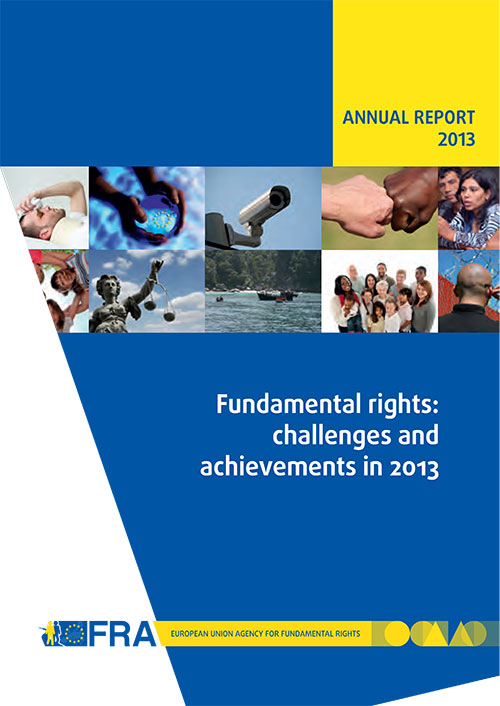Ein Jahr im Rückblick: FRA wirft ein Schlaglicht auf das Jahr 2014
Date of article: 24/12/2014
Daily News of: 05/01/2015
Country:  EUROPE
EUROPE
Author: European Union Agency for Fundamental Rights
Article language: de

An den Arbeitsergebnissen der FRA im Laufe des Jahres lassen sich unterschiedliche Herausforderungen ablesen, mit denen die EU konfrontiert ist. Diese reichten von der Entlarvung des Ausmaßes der Gewalt gegen Frauen in unserer Gesellschaft bis hin zu einem wachsenden politischen Dissens rund um Themen wie Migration und Asyl, ganz zu schweigen von der Herausforderung, ein Gleichgewicht zwischen den Rechten der Bürger einerseits und dem Schutz Europas vor potenziellen Sicherheitsbedrohungen andererseits herzustellen.
Bekämpfung von Gewalt gegen Frauen
Die tagtägliche Realität der Gewalt gegen Frauen in der EU wurde in dem richtungsweisenden Bericht der FRA „Gewalt gegen Frauen: eine EU-weite Erhebung. “ dokumentiert. Aufgrund von persönlichen Befragungen von 42 000 Frauen in den 28 EU-Mitgliedstaaten ist dieser Bericht die weltweit größte Erhebung zum Thema Gewalt gegen Frauen, die erstmals vergleichbare Daten über die Gewalterfahrungen von Frauen in der EU zur Verfügung stellt. 
Die Ergebnisse waren ernüchternd: 33 % der Frauen haben körperliche und/oder sexuelle Gewalt erfahren, dies entspricht 62 Millionen Frauen in der EU und damit mehr Menschen als die gesamte Bevölkerung Italiens! Die Befragungen haben aber auch deutlich gemacht, dass 5 % aller Frauen vergewaltigt und 18 % Opfer von Stalking wurden. Sie haben darüber hinaus gezeigt, wie Cybermobbing zunehmend zu einem Problem wird, da immer mehr Menschen online kommunizieren.
Die Studie wurde einige Monate vor Inkrafttreten der Istanbul-Konvention des Europarates veröffentlicht. Bei diesem Übereinkommen handelt es sich um ein umfassendes Regelwerk für wirksame Strategien zur Bekämpfung von Gewalt gegen Frauen in Europa. Zusammen mit den Daten aus der FRA-Erhebung bildet sie ein solides Fundament, mit dem die massive Gewalt, der viele Frauen ausgesetzt sind, beseitigt werden soll, ein Prozess, an dem die FRA zusammen mit einigen Mitgliedstaaten arbeitet.
Gewährleistung eines an den Grundrechten orientierten Migrationsansatzes
Die diesjährige Grundrechtskonferenz befasste sich mit dem Thema Grundrechte und Migration in die EU. Die Veranstaltung wurde zusammen mit dem italienischen EU-Ratsvorsitz ausgerichtet und brachte mehr als 300 politische Entscheidungsträger und Fachleute aus der ganzen EU zusammen. Die Schlussfolgerungen der Konferenz machen deutlich, dass mit dem Thema Migration in der EU anders umgegangen werden muss, um so die Notwendigkeit und die Vorteile, die Migranten für ihre Aufnahmeländer bieten, deutlich zu machen und eine ganzheitlichere Herangehensweise an die Migrationspolitik in der EU zu entwickeln. Es wurden wichtige Vorschläge unterbreitet mit dem Ziel,

- mehr Klarheit bezüglich der grundrechtlichen Verpflichtungen der Mitgliedstaaten an den Außengrenzen der EU zu gewährleisten, insbesondere die Notwendigkeit, ein Verbot der Ausweisung und Zurückweisung zu vermeiden,
- die rechtlichen Möglichkeiten für schutzbedürftige Menschen, in die EU zu gelangen, auszubauen, einschließlich ihrer Umsiedlung und Aufnahme aus humanitären Gründen,
- die Bekämpfung der Schleuserkriminalität zu intensivieren und zugleich Strafen für die Gewährung von humanitärer Hilfe ausdrücklich auszuschließen,
- eine uneingeschränkte Umsetzung der Grundrechte von Migrantenkindern, auch während des Transits und der Aufnahme, zu gewährleisten,
- Strategien für Integration und soziale Eingliederung in die allgemeine Migrationspolitik einzubinden und die Fortschritte der Mitgliedstaaten in Integrationsfragen zu überwachen.
Im Rahmen der Veranstaltung wurden auch zwei neue Berichte über Migrationsverfahren in der EU vorgestellt: Fundamental rights at airports: border checks at five international airports in the European Union, (Grundrechte auf Flughäfen: Grenzkontrollen auf fünf internationalen Flughäfen in der Europäischen Union) und and (Grundrechte an den Landgrenzen: Erkenntnisse von ausgewählten Grenzübergangsstellen der Europäischen Union)..
Gestaltung der EU-Strategie der inneren Sicherheit

Die FRA wurde um einen Beitrag zu den Gesprächen der Europäischen Kommission über eine zukünftige EU-Strategie der inneren Sicherheit für den Zeitraum 2015-2020 gebeten. Diese Gespräche fanden im Rahmen einer Resolution des UN-Sicherheitsrats statt, mit der die wachsende Bedrohung durch gewalttätigen Extremismus verurteilt und die Notwendigkeit unterstrichen wird, sich mit der Frage ausländischer Kämpfer auseinanderzusetzen.
Die FRA hat anerkannt, dass die innere Sicherheit der EU durch viele Herausforderungen gefährdet ist, von Computerkriminalität bis hin zu Terrorismus, hat zugleich aber hervorgehoben, wie wichtig die Verankerung der Grundrechte in künftige interne Sicherheitsstrategien ist. Dadurch könnten die vorgeschlagenen Maßnahmen nachhaltiger gestaltet und zugleich für Rechtssicherheit und öffentliches Vertrauen Sorge getragen werden – ein Schlüsselthema im Zusammenhang mit den jüngsten Enthüllungen der Massenüberwachungen.
Schlaglicht auf Herausforderungen und Erfolge in Verbindung mit Grundrechten in der EU
 Neben den drei wichtigsten, bereits genannten Höhepunkten für die FRA hat Europa in den letzten 12 Monaten in mehreren Bereichen wichtige Schritte zum Schutz der Grundrechte unternommen, wie aus dem Jahresbericht der FRA hervorgeht. Dazu gehören die Umsetzung von Rechtsreformen in Bezug auf Asyl, Fortschritte bei der Umsetzung der EU-Opferrichtlinie in einzelstaatliches Recht und die Anwendung von nationalen Strategien für die Integration der Roma. Doch weisen die anhaltenden Einschränkungen infolge der rigiden Sparpolitik und von Krisen wie der Tragödie vor Lampedusa darauf hin, dass zwischen Politik und Realität Ungereimtheiten vorhanden sind und dort erheblicher Verbesserungsbedarf besteht.
Neben den drei wichtigsten, bereits genannten Höhepunkten für die FRA hat Europa in den letzten 12 Monaten in mehreren Bereichen wichtige Schritte zum Schutz der Grundrechte unternommen, wie aus dem Jahresbericht der FRA hervorgeht. Dazu gehören die Umsetzung von Rechtsreformen in Bezug auf Asyl, Fortschritte bei der Umsetzung der EU-Opferrichtlinie in einzelstaatliches Recht und die Anwendung von nationalen Strategien für die Integration der Roma. Doch weisen die anhaltenden Einschränkungen infolge der rigiden Sparpolitik und von Krisen wie der Tragödie vor Lampedusa darauf hin, dass zwischen Politik und Realität Ungereimtheiten vorhanden sind und dort erheblicher Verbesserungsbedarf besteht.

 Former Yugoslav republic of Macedonia
Former Yugoslav republic of Macedonia
